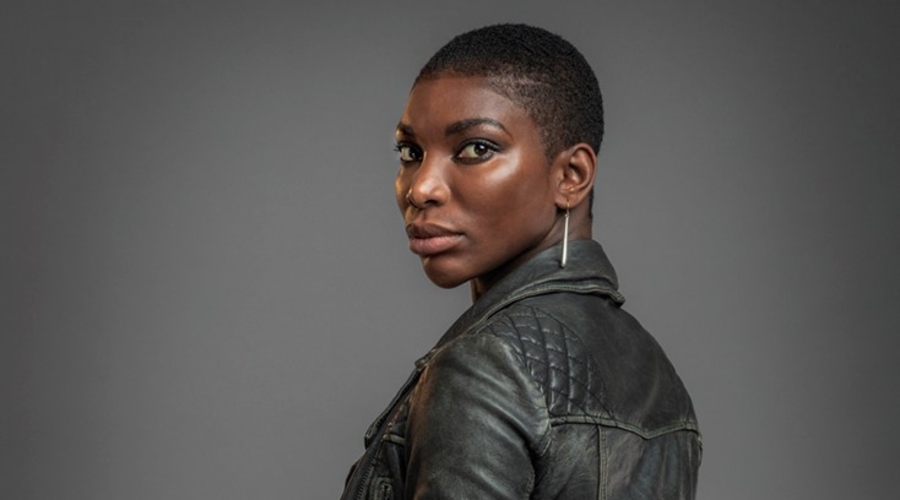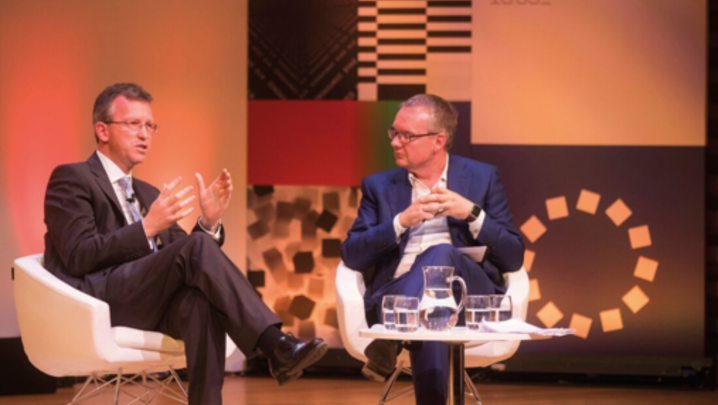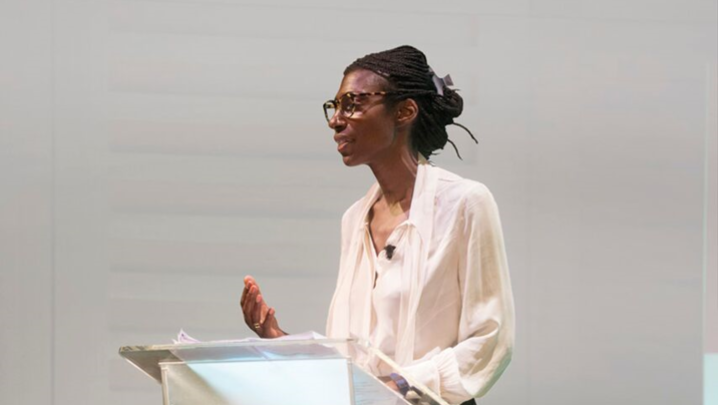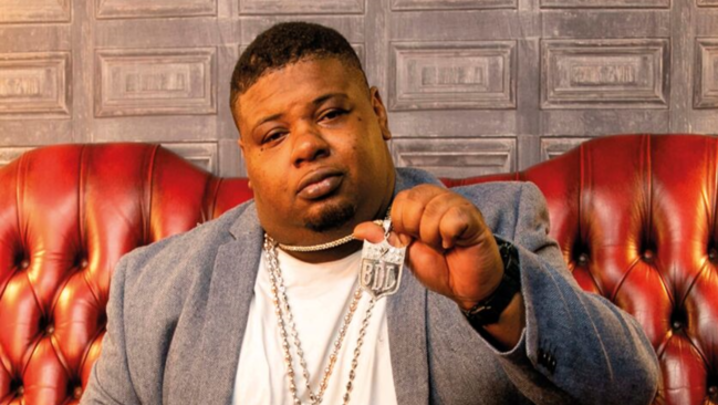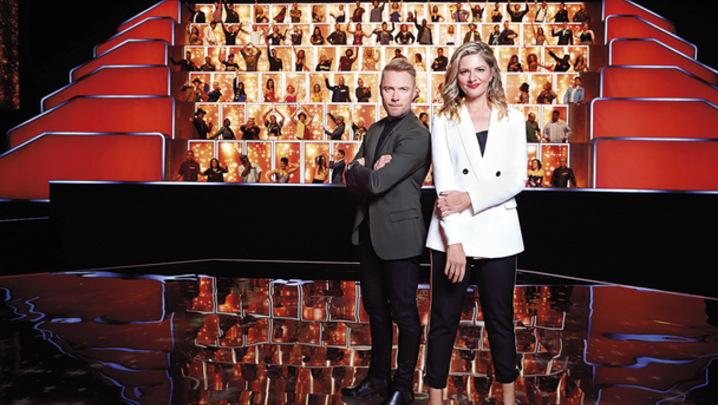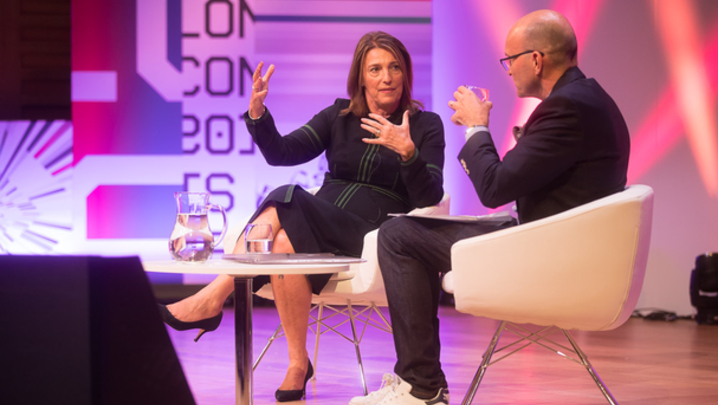For programme-buyers, building subscriber loyalty and channel identity can trump a show’s expected ratings, learns Steve Clarke
Take three very different commissioners, all united by a common purpose: securing and showing content that satisfies their audiences. But achieving that simple aim is rarely straightforward in an increasingly complex media environment.
First things first. Picking up from Tony Hall’s impassioned plea that policy makers act to protect the BBC, session chair Kirsty Wark asked Georgia Brown and Zai Bennett – from Amazon Studios and Sky, respectively – whether public service broadcasting was still necessary in these contentrich times.
The two competing commissioners didn’t hesitate in giving the PSBs their fulsome support.
“They are hugely important to the ecosystem of the broadcasting landscape,” said Brown. “That’s why we work very closely with them. It’s really important that we support them.”
Amazon Studios has partnered with the BBC on such scripted fare as Fleabag and King Lear (starring Anthony Hopkins). In a previous life, Brown worked for BBC Worldwide.
“They’re incredibly important for our platform,” added Bennett, who used to run BBC Three, before it was reduced to an online-only service.
So far, so good for traditional TV, as Wark turned her attention to each individual commissioner, starting with Amazon.
Critics routinely accuse the online giant of seeking global domination as it spends jaw-dropping sums on content – its remake of Lord of the Rings will cost a reported $1bn and run for a minimum of five seasons.
One of the highlights of Amazon’s summer line-up was a documentary series on Premier League title winners Manchester City, All or Nothing, clips from which were shown to the RTS audience.
Wark asked how many people had watched the documentary. Unsurprisingly, Brown, who joined Amazon’s new, London-based commissioning hub in June 2017, declined to give a figure.
What she was willing to share was that Amazon Prime Video had in excess of 100 million international viewers. The retailer’s main criterion for measuring a show’s success was audience “fanaticism”, frequently conveyed via social-media buzz.
“I love getting on the Tube in the morning and seeing how many people are watching it on their iPad,” she said.
Did Brown agree with the BBC Director-General’s view that British audiences demand British content?
Absolutely, she did, and noted that shows such as King Lear and the new BBC One thriller Informer (an Amazon co-production) proved her point.
“I think we are slightly different. We are very invested in supporting the British broadcast industry. We’re not here to compete… we’re looking at the wider space.”
Wark looked sceptical. So, what audience was Amazon trying to garner? “We have an incredibly broad audience. Our Prime audience ranges hugely in terms of age and demographics. It’s about finding pockets of audiences who are particularly fanatical about our shows.”
Then it’s all about getting something different? “Which is incredibly hard, which is why we’re relying on the production community to come to us with things they are passionate about.”
What, precisely, was Brown looking for? “It’s the golden question. I hate to say it, but you know it when you see it.… We are commissioning very locally, we don’t commission necessarily through a global lens. I want shows that will resonate locally.”
Turning to Ian Katz, who started work as Channel 4’s director of programmes in January, Wark asked what he regarded as a channel-defining show.
He said that James Graham’s new Brexit drama, starring Benedict Cumberbatch, was “a very good example of the kind of thing I’d like to make more of.… It grapples with the biggest arguments of the day and plunges into the kind of contested territory that is less appealing to other broadcasters.
“It is quintessentially Channel 4 and in that great tradition of political drama that goes back to GBH and A Very British Coup.”
Does it matter how big the ratings are or is it all about Channel 4’s reputation? “Of course, you always want both,” replied Katz, adding: “Look, we’re all having to ride two horses. We’re commissioning linear television with an eye to driving digital growth. That means looking at the types of programmes that prosper on digital.”
So how does the broadcaster find the money for drama when its budget is not large compared with Netflix or even BBC One? “In the eight or nine months I’ve been at Channel 4, I’ve been encouraged by a growing sense among writers, some on-screen talent and producers that they want to see their stuff on UK PSBs.
“There are all sorts of attractions to the SVoDs – initially, tons of money – but, increasingly, I’m hearing people saying: ‘We want to see our stuff landed with the audience where we’re writing and getting a huge amount of TLC and it is not going to be one of 500 productions that come with a massive platform.’”
But, surely, writers are drawn by the big bucks that Netflix and co can offer? “Yes, it’s huge but along with new competition have come amazing opportunities for collaboration.”
Talking of which, Katz was sitting alongside his new best friend, Zai Bennett – Channel 4 and Sky had recently announced a content-sharing agreement that initially involves drama and Formula 1.
Nonetheless, the ex-Newsnight and Guardian executive acknowledged that there were new pressures as Channel 4 sought to be distinctive in a crowded content space.
“The challenge we’ve got is that viewers have got access to an unlimited number of flavours,” he said. “That’s great for viewers. But it means that we’ve got to be a stronger flavour. We have to go almost back to basics and ask ourselves what the core ingredients of the flavour that we are supposed to be are and dial them up.”
Finally, it was the Sky man’s turn in the limelight. Flush with success in scripted shows such as Patrick Melrose, Sky has nimbly provided an answer to the SVoDs by ramping up original scripted shows and by its deft marketing of Now TV.
Bennett revealed that he had had to wait a whole two years for Benedict Cumberbatch to sign on the dotted line and noted: “It’s about being there at the inception of the idea that works for us as a commissioning process.”
He showed the RTS a clip from Karl Pilkington’s new comedy, Sick of It, described as “quite an audacious thing for us to have done”. Sky’s “scripted strategy has been going from strength to strength. Our drama is on fire.”
Was the aim to boost subscriptions or increase ratings? “It’s about subscriptions, making sure those customers feel they are getting value,” Bennett confirmed.
“The number of viewers is important, too. Lots of our drama gets 2 million-plus. If we sometimes get half a million, that’s fine.”
As for the competition, creatively, he saw Amazon and Netflix as Sky’s chief rivals, “whether we’re looking at writers or directors”.
He added: “We show the best of the US. That’s an important part of what we do but, increasingly, we’re devoting more effort to original productions. They are tent-pole events for our customers.”
The BBC, ITV and Channel 4 have all collaborated with the digital giants but will the streaming services soon stop investing in shows that are broadcast by the British PSBs? Georgia Brown refuted this: “We will continue to invest heavily in co-production. Taking a stake in those UK shows is very important to us. It is not something we’re about to pull out of.”
But Bennett had a different view: “I think there is probably less co-production with Netflix. It would be great to do more. We have done some, but it looks like it’s dwindling. There are fewer places to go to.
“But the main thing when you’re originating new shows is that you are willing to put your money where your mouth is. You’ve got to be prepared to fully fund it.”
Regarding the key question of rights ownership, Brown insisted that Amazon was committed to negotiating fair deals with producers.
“My background is in the business of funding shows for indies and helping them to get that funding together,” she said. “The idea of warehousing rights and sitting on them and owning these things globally so people can’t make money in the future is mad. That will kill our industry.”
Channel 4 knows from bitter experience with Black Mirror (poached by Netflix), the disruptive power of the on-demand behemoths.
Katz noted that, nowadays, it was more difficult to forge long-term relationships with talent. Once Michaela Coel broke through via Chewing Gum people were queuing up to hire her; her latest showcase, BBC Two’s Black Earth Rising, will be shown on Netflix after its UK BBC window.
But Katz also struck an upbeat note: “I came into this feeling a bit glass-half-full regarding Netflix et al, particularly regarding the conversations concerning talent, but the conversations I have had at Channel 4 have been heartening.
“People value your creative input. We often hear that people love working for Netflix because they don’t give you notes, but, actually, when you talk to people, they value notes. Also, people like knowing how their show’s done.”
He revealed that younger audiences discovering old episodes of a show on Netflix can help boost ratings for the broadcaster as they then seek out the show on the original platform: “We’ve just had the most successful ever series of Friday Night Dinner on Channel 4. Did it have something to do with the fact that the first two series had recently gone on to Netflix and a new generation of younger viewers had discovered it?”
So have the SVoDs upped people’s game? “Absolutely,” said Bennett. “It’s competition. There’s always been competition and that’s good for the ecology of what we’re doing.”
Session Seven, ‘Commission accomplished’, was chaired by journalist, broadcaster and writer Kirsty Wark. The panellists were: Zai Bennett, director of programmes, Sky Entertainment UK and Ireland; Georgia Brown, director of European originals, Amazon Studios; and Ian Katz, director of programmes, Channel 4. The producers were Alan Clements and Charlotte Elston.

